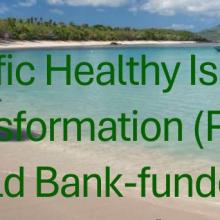
The Government of Tonga (GOT), amongst others in the region has requested funding for the Pacific Healthy Islands Transformation (PHIT) Project to be financed by the World Bank (WB) through the International Development Association (IDA). PHIT Project is a regional project involving Fiji, Kiribati, Tonga and Tuvalu, and the Pacific Community (SPC) as a key regional coordinating partner. The PHIT project is designed as a suite of regional investments to support the transformation of Pacific health systems into fit-for-purpose primary health care (PHC) oriented health systems that promote health and deliver adequate preventive and curative services in the region.
The Ministry of Health (MOH) will be the Implementing Agency for the PHIT Project in Tonga, to deliver on the project development objective, of strengthening access to quality health services within participating Pacific Island Countries, with a focus on Non-Communicable Diseases (NCD) management. PHIT will complement and boost the impact of existing national health systems investments, including the WB funded Health Enhancement and Resiliency in Tonga (HEART) Project (P180965).
PHIT Project has been rated by the WB as having Substantial environmental and social risks. These risks are predominantly temporary, predictable, and reversible in nature with appropriate mitigation. The project involves spatial and geographical complexity as it spans multiple countries and impacts rural, urban, and remote outer island populations. Activities to be undertaken under the Project are required to comply with the WB Environmental and Social Framework (ESF) and will be supported by these disclosed Environment and Social Instruments to be implemented and complied with:
1. Environmental & Social Commitment Plan (ESCP) - Click here to access
2. Environmental & Social Management Framework (ESMF) - Click here to access
3. Stakeholder Engagement Framework (SEF) - Click here to access
4. Labor Management Framework (LMF) - Click here to access
The current disclosure aims to solicit feedback (verbal and/or written) from stakeholders on the presented ESCP, ESMF, SEF and LMF for the PHIT Project.
The ESCP sets out material measures and actions, any specific documents or plans, as well as the timing for each of these.
The ESMF maps out the participating countries' laws and regulations and the World Bank policies applicable to the Project, and describes the principles, approaches, implementation arrangements, and environmental and social mitigation measures to be followed.
The SEF provides the principles and requirements for the development of specific Stakeholder Engagement Plans for each country. It is designed to help Borrowers identify key aspects of stakeholder engagement relevant to each sub-project.
The LMF sets out the requirements and expectations for the project to meet the conditions of the World Bank’s Environmental and Social Standard 2 (ESS2) on Labor and Working Conditions.
For feedback or queries on the above any time during project preparation and implementation you may contact:
Ministry of Health
Chief Executive Officer for the Ministry of Health, Mr Reynold 'Ofanoa ( reynoldofanoa@gmail.com)
PH- 7400200 web:health.gov.to
HEART Project Manager – Mr Semisi Fukofuka (fukofukas@health.gov.to)
CSU Environmental & Social Specialist – Ms Andrea Taliaúli (ataliauli24@gmail.com)
- Log in to post comments

